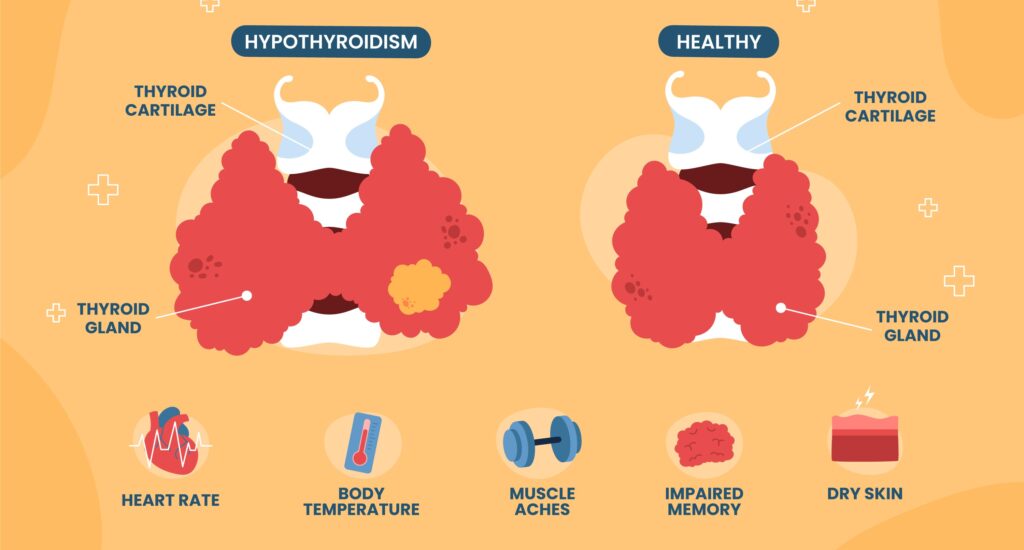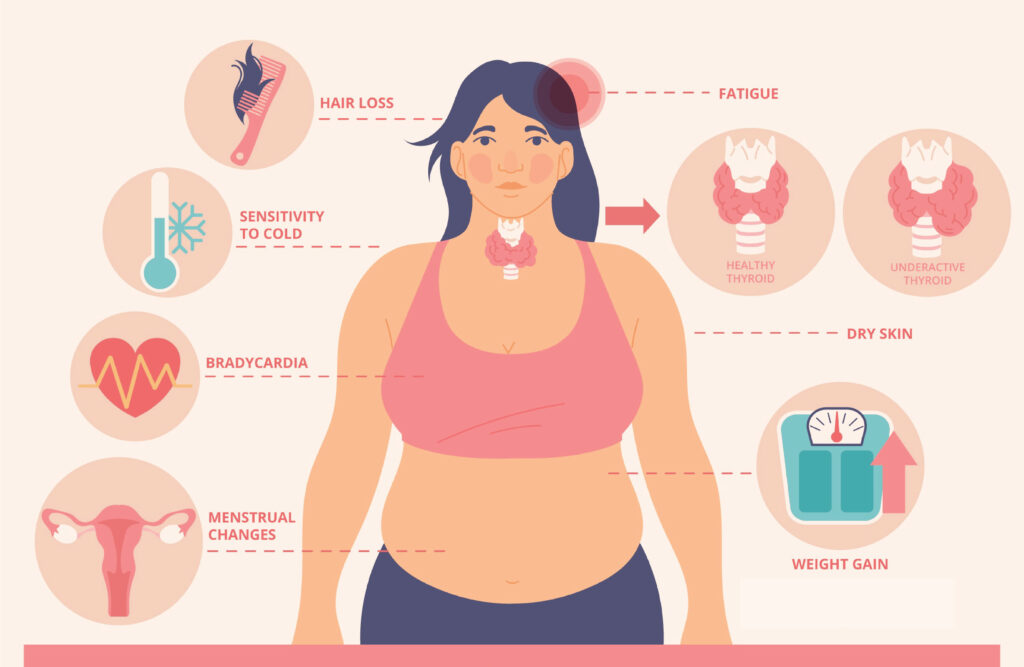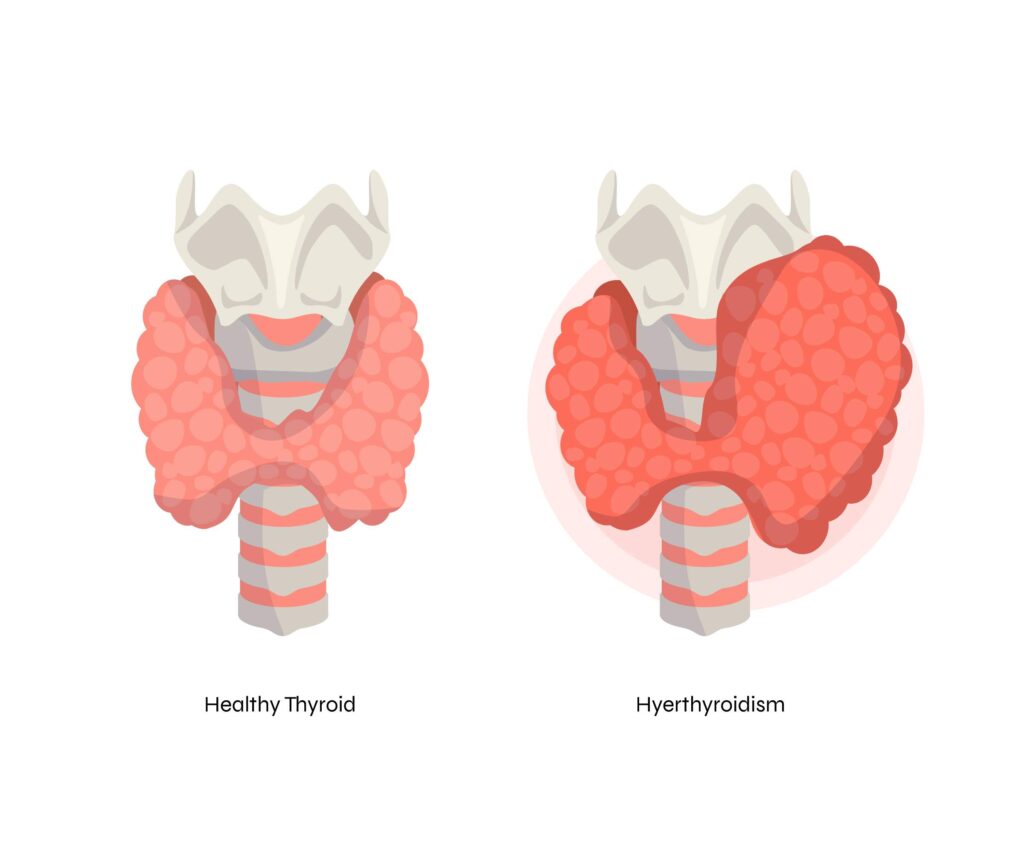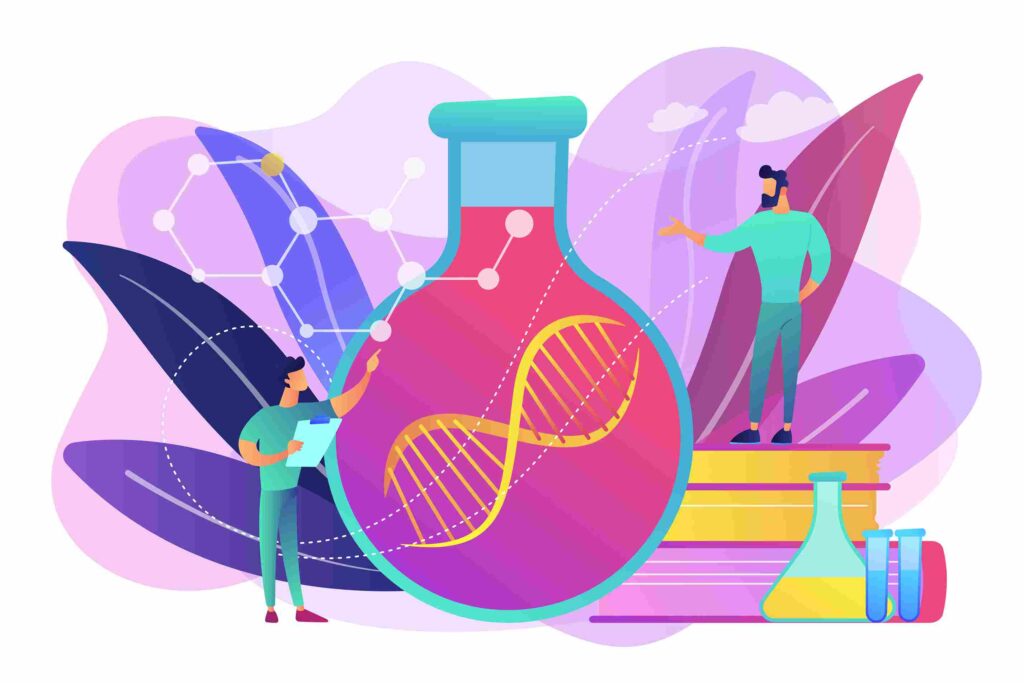Dr. Soumya Singh
Thyroid gland’s entity might be small but it has a profound impact on human health. The butterfly-shaped organ located at the base of the throat produces hormones that regulate metabolism, growth, and development throughout the body. When the thyroid malfunctions, it can lead to a cascade of health issues affecting nearly every bodily system. In recent years, research has also uncovered important genetic factors that influence thyroid function and disorder risk. This article will explore the critical role of the thyroid gland, common thyroid disorders and their symptoms, and the understanding of genetic influences on thyroid health.

Essential Functions of thyroid
The thyroid gland produces two main hormones: thyroxine (T4) and triiodothyronine (T3). These hormones play crucial roles in:
1. Metabolism: Thyroid hormones regulate how quickly the body burns calories and uses energy.
2. Growth and development: They are essential for proper physical and neurological development, especially in children and adolescents.
3. Body temperature: Thyroid hormones help maintain normal body temperature.
4. Heart rate: They influence how fast the heart beats.
5. Nervous system function: Thyroid hormones affect nerve signal transmission and cognitive function.
6. Reproductive health: They impact fertility and menstrual cycles in women.
Given these wide-ranging effects, it’s clear why thyroid dysfunction can have such significant consequences for overall health.
Common Thyroid Disorders
Thyroid disorders generally fall into two main categories: hypothyroidism (underactive thyroid) and hyperthyroidism (overactive thyroid). Each of these conditions can stem from various causes and presents distinct symptoms.
Hypothyroidism

In hypothyroidism, the thyroid gland doesn’t produce enough hormones. This leads to a general slowing of bodily functions. Common symptoms include:
– Fatigue and weakness
– Weight gain
– Increased sensitivity to cold
– Dry skin and hair
– Depression
– Constipation
– Muscle aches and stiffness
– Irregular or heavy menstrual periods
Hyperthyroidism

Hyperthyroidism occurs when the thyroid produces too much hormone, leading to an acceleration of bodily functions. Symptoms often include:
– Rapid heartbeat
– Nervousness and anxiety
– Increased sweating
– Weight loss despite increased appetite
– Tremors in hands and fingers
– Sleep difficulties
– More frequent bowel movements
– Enlarged thyroid gland (goiter)
Long-Term Effects of Thyroid Dysfunction
If left untreated, both hypothyroidism and hyperthyroidism can lead to serious health complications.
Untreated hypothyroidism may result in:
– Goiter (enlarged thyroid gland)
– Heart problems, including increased risk of heart disease and heart failure
– Mental health issues, such as depression and cognitive decline
– Peripheral neuropathy (nerve damage in extremities)
– Myxedema, a rare but life-threatening condition characterized by severe drowsiness, unconsciousness, and lowered body temperature
Uncontrolled hyperthyroidism can lead to:
– Heart rhythm disorders, including atrial fibrillation
– Osteoporosis due to accelerated bone loss
– Eye problems, particularly in Graves’ disease
– Thyrotoxic crisis, a life-threatening condition involving extremely high thyroid hormone levels
The Genetic Connection
While lifestyle factors and environmental exposures play roles in thyroid health, genetics also significantly influence thyroid function and disorder risk. Recent research has shed light on several genetic factors:
1. Hereditary Risk: Both hypothyroidism and hyperthyroidism tend to run in families. Having a close relative with a thyroid disorder increases an individual’s risk.
2. Autoimmune Susceptibility: Genes associated with autoimmune disorders, including those affecting the thyroid like Hashimoto’s thyroiditis and Graves’ disease, have been identified. These include variations in genes involved in immune system regulation, such as the HLA (Human Leukocyte Antigen) gene complex.
3. Thyroid Hormone Production: Mutations in genes involved in thyroid hormone synthesis, such as the thyroglobulin (TG) gene and the thyroid peroxidase (TPO) gene, can lead to congenital hypothyroidism.

4. Thyroid Cancer Risk: Certain genetic mutations, like those in the RET gene, are associated with increased risk of medullary thyroid cancer.
5. Iodine Metabolism: Variations in genes involved in iodine uptake and utilization can affect thyroid function. For example, mutations in the sodium/iodide symporter (NIS) gene can impair iodine transport into thyroid cells.
6. Thyroid Hormone Receptors: Genetic variations affecting thyroid hormone receptors can lead to thyroid hormone resistance, a rare condition where the body’s tissues are less responsive to thyroid hormones.
Understanding these genetic factors is crucial for several reasons:
– Improved Risk Assessment: Genetic testing can help identify individuals at higher risk for thyroid disorders, allowing for earlier intervention and monitoring.
– Personalized Treatment: Knowledge of a patient’s genetic profile may help tailor treatment approaches, potentially improving outcomes.
– Family Planning: Couples with a family history of thyroid disorders can benefit from genetic counseling to understand potential risks to their offspring.
– Drug Development: Insights into the genetic basis of thyroid disorders are paving the way for new, targeted therapies.
Diagnosis and Treatment

Given the wide-ranging effects of thyroid disorders and their potential genetic components, proper diagnosis and treatment are crucial. Diagnosis typically involves:
1. Blood tests to measure thyroid hormone levels (TSH, T4, T3)
2. Physical examination, including palpation of the thyroid gland
3. Imaging tests like ultrasound or radioiodine scans
4. In some cases, fine-needle aspiration biopsy to check for cancer
Treatment approaches vary depending on the specific disorder but may include:
– Hormone replacement therapy for hypothyroidism
– Anti-thyroid medications, radioiodine therapy, or surgery for hyperthyroidism
– In some cases, thyroid cancer treatment involving surgery, radioiodine therapy, and targeted drug therapies
The Future of Thyroid Care
As our understanding of thyroid disorders and their genetic underpinnings grows, the future of thyroid care looks promising. Emerging areas of research and potential advancements include:

1. Precision Medicine: Tailoring treatments based on an individual’s genetic profile and specific type of thyroid dysfunction.
2. Gene Therapy: Potential future treatments could involve correcting genetic defects associated with thyroid disorders.
3. Improved Autoimmune Treatments: Better understanding of the genetic basis of autoimmune thyroid disorders may lead to more targeted therapies that address the root cause of the immune system malfunction.
4. Advanced Diagnostic Tools: Development of more sensitive and specific tests for early detection of thyroid dysfunction and related complications.
5. Preventive Strategies: As we identify more genetic risk factors, we may be able to develop preventive measures for high-risk individuals.
The thyroid gland, though small, plays a vital role in maintaining overall health. Thyroid disorders can have far-reaching effects on the body, impacting everything from metabolism to heart function and mental health. The growing understanding of genetic influences on thyroid function not only helps explain why these disorders often run in families but also opens new avenues for diagnosis, treatment, and prevention. As research continues to unravel the complex interplay between genetics and thyroid health, we can look forward to more personalized and effective approaches to managing thyroid disorders, ultimately improving quality of life for millions of people worldwide.
Author’s Biography
Dr. Soumya Singh, Head of Partnerships at InnovatioCuris, is a healthcare expert with a postgraduate degree in Health and Hospital Management and a background in dentistry. Her articles provide valuable insights into healthcare administration and innovation.

